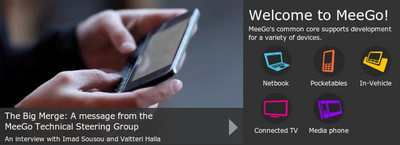Maemo's community involvement infrastructure is what MeeGo needs

Nokia's Maemo and Intel's Moblin are merging to form MeeGo, a development environment for a new class of internet-connected devices ranging from smartphones through netbooks to TV sets. This may be finally what provides the free software world with a consistent and modern alternative to the iPhones and iPads that the proprietary world has come up with, the "magical user experiences" Linux Foundation's Jim Zemlin was asking for.

Unlike Android, both Moblin and Maemo stacks have been very promising in the sense that they've been closely aligned with existing and well-known Linux desktop technologies. All RPC communications happen through D-Bus, Qt or Clutter is used as the GUI toolkit, there is Telepathy for integrated VoIP and IM communications, and Moblin even comes with the GeoClue location service.
So far the discussion about this merge has very much focused on technical terms: what toolkit to use (Qt is recommended), what package manager (RPM) and so forth. However, what hasn't been discussed yet is what will happen to Maemo's excellent infrastructure for community involvement:
- Brainstorm is a tool for proposing ideas and solutions to them, and then voting to qualify them. This is a very good way to gather ideas and feedback from the community, and some brainstorms have even ended up having community-led free implementations available, freeing Nokia from having to write all platform functionality
- Talk is the very popular forum for both Maemo end users and developers. Having an open forum to discuss it all, and having also people from Nokia and Intel there would help to communicate the aims and decisions around the platform a lot better
- Packages and Downloads provide a fully open and crowdsourced "app store experience" where the community is free to develop, upload and install Maemo applications through a consistent service that provides quality control, nice installers and a free API for browsing the software available
- Community Council and the Sprint process have been the way Maemo's community infrastructure has been designed and developed out in the open. The various tasks have been documented in the Wiki, and people have been able to follow the progress through a Qaiku workstream
- Karma is a way to credit community members for their involvement. The involvement can be technical (for instance, developing a popular Maemo application) or social (publishing popular blog posts or helping people on Talk), and has been used as a criteria for Community Council and other elections. Karma also helps Nokia to qualify community members, to find the people who should have access the developer devices for instance. In a large community it is hard to identify the people who are just loud and the people who are doing actual valuable contributions from each other without such tools
- Social News and Planet are a way for the community to aggregate and promote important posts around the project. We look at things like social bookmarking, blog links and votes happening on the Maemo site to determine the most important stories of the day, to provide an "automatic newspaper" for the project
Providing all or some of these services as part of the MeeGo infrastructure would enable the community to feel involvement, and even ownership in the new project that is shaping up. This is critical for a project that has such a big reliance on new innovation and connectivity with the upstream, especially at the time of such big change.
